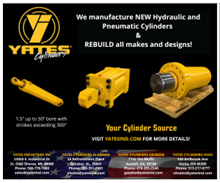Nippon-Kobe Joint Company to Recycle Steel Dust into DRI
10/03/2008 - Nippon Steel and Kobe Steel will establish a joint company that will recycle steel dust using the FastMet process to produce usable direct-reduced iron.
Nippon Steel Corp. and Kobe Steel Limited have entered into a contract to establish a joint company for recycling steel dust and the production and use of direct-reduced iron (DRI). The two companies had been evaluating the possible development of such a venture as a means of expanding and enhancing their ongoing cooperative ties.
The joint company—Nittetsu Shinko Metal Refine Co., Ltd.—will be established on the grounds of Nippon Steel’s Hirohata Works. It will produce DRI from steel dust and iron ore powder with the objective of capturing and making effective use of the iron and zinc content contained in the steel dust.
The two companies anticipate they will make a total capital investment of approximately 20 billion yen (70% Nippon Steel, 30% Kobe Steel), primarily for a rotary-hearth-type reduction furnace and related equipment. The capital investment will commence once the joint company receives approval to recycle steel dust, with operations planned to start about two years after the start of capital investment.
Construction of the new facility will begin once the joint company receives approval to recycle steel dust from the Ministry of the Environment. The new recycling facility will feature a Kobe Steel FastMet® Plant using a rotary hearth furnace. The joint company will recycle the steel dust it receives and produce DRI to be supplied primarily to Nippon Steel and Kobe Steel. A portion will also be supplied to Nippon Steel affiliate Sanyo Special Steel Co., Ltd..
The rotary hearth furnace—the core operating equipment of the FastMet Process—is a donut-shaped furnace that recycles steel dust at high process temperatures and speeds to produce DRI. The rotary hearth furnace is also able to abstract zinc from the steel dust. The DRI will be reused in the steel manufacturing process and the abstracted zinc will be reused in nonferrous processes. Recycling these materials will promote zero emissions while reducing usage of scrap metal, iron ore, and zinc ore.
The new equipment will have an annual capacity of approximately 400,000 tonnes, making the facility one of the largest production processing operations in Japan. The economy of scale will help to increase the cost competitiveness of DRI while providing a number of environmental benefits.
The new company’s rotary hearth furnace will become the fourth rotary hearth furnaces in use on the grounds of the Nippon Steel’s Hirohata Works. In conjunction with the installation of this furnace, Nippon Steel also plans to begin utilizing the No. 1, 2, and 3 rotary hearth furnaces currently in operation (or under construction) at the Hirohata Works to process steel dust produced by alliance partners Sumitomo Metal Industries, Ltd. (Wakayama works), Nisshin Steel Co., Ltd. (Kure works), and Nakayama Steel Works, Ltd..
The new operation’s configuration as a joint operation between Nippon Steel and Kobe Steel is aimed at securing a stable source of materials as well as promoting recycling and zero emissions at all of the alliance members. At the same time, the combination of Nippon Steel’s proven operating technologies for recycling and effective usage of steel dust and Kobe Steel’s proven rotary hearth furnace technology will strengthen the mutual advantages of the relationship between the two companies. Inclusion of the alliance members will also create a new business model for improving the overall efficiency of steel dust recycling in the Kansai region.
Nippon Steel and Kobe Steel intend to smoothly advance the new joint business while continuing to actively strengthen and promote their relationship.
The joint company—Nittetsu Shinko Metal Refine Co., Ltd.—will be established on the grounds of Nippon Steel’s Hirohata Works. It will produce DRI from steel dust and iron ore powder with the objective of capturing and making effective use of the iron and zinc content contained in the steel dust.
The two companies anticipate they will make a total capital investment of approximately 20 billion yen (70% Nippon Steel, 30% Kobe Steel), primarily for a rotary-hearth-type reduction furnace and related equipment. The capital investment will commence once the joint company receives approval to recycle steel dust, with operations planned to start about two years after the start of capital investment.
Construction of the new facility will begin once the joint company receives approval to recycle steel dust from the Ministry of the Environment. The new recycling facility will feature a Kobe Steel FastMet® Plant using a rotary hearth furnace. The joint company will recycle the steel dust it receives and produce DRI to be supplied primarily to Nippon Steel and Kobe Steel. A portion will also be supplied to Nippon Steel affiliate Sanyo Special Steel Co., Ltd..
The rotary hearth furnace—the core operating equipment of the FastMet Process—is a donut-shaped furnace that recycles steel dust at high process temperatures and speeds to produce DRI. The rotary hearth furnace is also able to abstract zinc from the steel dust. The DRI will be reused in the steel manufacturing process and the abstracted zinc will be reused in nonferrous processes. Recycling these materials will promote zero emissions while reducing usage of scrap metal, iron ore, and zinc ore.
The new equipment will have an annual capacity of approximately 400,000 tonnes, making the facility one of the largest production processing operations in Japan. The economy of scale will help to increase the cost competitiveness of DRI while providing a number of environmental benefits.
The new company’s rotary hearth furnace will become the fourth rotary hearth furnaces in use on the grounds of the Nippon Steel’s Hirohata Works. In conjunction with the installation of this furnace, Nippon Steel also plans to begin utilizing the No. 1, 2, and 3 rotary hearth furnaces currently in operation (or under construction) at the Hirohata Works to process steel dust produced by alliance partners Sumitomo Metal Industries, Ltd. (Wakayama works), Nisshin Steel Co., Ltd. (Kure works), and Nakayama Steel Works, Ltd..
The new operation’s configuration as a joint operation between Nippon Steel and Kobe Steel is aimed at securing a stable source of materials as well as promoting recycling and zero emissions at all of the alliance members. At the same time, the combination of Nippon Steel’s proven operating technologies for recycling and effective usage of steel dust and Kobe Steel’s proven rotary hearth furnace technology will strengthen the mutual advantages of the relationship between the two companies. Inclusion of the alliance members will also create a new business model for improving the overall efficiency of steel dust recycling in the Kansai region.
Nippon Steel and Kobe Steel intend to smoothly advance the new joint business while continuing to actively strengthen and promote their relationship.



.jpg?lang=en-US&ext=.jpg)
.gif?width=220&height=200&mediaprotectionhash=374c6b9a31f2b2fbfc7937391034efb46fd57feba997b9ad2ae9a0bd3d48329d&ext=.gif)

.gif?width=100&height=200&mediaprotectionhash=e2d5b15d68f84f22038524be6c58e5268d67b7f44494b544e29a8d53c5b959ba&ext=.gif)
